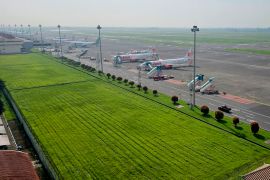Head of the National Food Agency (Bapanas), Arief Prasetyo Adi, said that stricter ODOL enforcement could increase logistics costs and potentially affect food prices.
However, he emphasized that the long-term benefits to public safety and infrastructure integrity outweigh these trade-offs.
“This is the consequence—when we control vehicles, especially ODOL transportation, the cost per unit rises. But safety matters,” he said.
He stressed that the zero ODOL policy is essential to protect road users, noting that overloaded trucks remain a major cause of road damage.
Asked about incentives, Adi confirmed that support will be provided to freight companies, with the technical implementation of the incentives handled by the Ministry of Transportation.
This will include the preparation of a Draft Presidential Regulation on Strengthening National Logistics, which will outline a comprehensive ODOL action plan.
Meanwhile, director of road transportation facilities and safety at the Ministry of Transportation, Yusuf Nugroho, said that the regulation includes nine key actions.
First, prioritizing the integration of goods transportation data with the help of electronic systems. The use of digital infrastructure is aimed at enhancing transparency, efficiency, and coordination across logistics networks, and allowing for better oversight and policy responsiveness.
Second, cleaning up law enforcement within the land transportation sector through systematic supervision, precise recording of violations, and strong measures to eliminate extortion and malpractices that have long undermined regulatory compliance.
Third, introducing a clear framework for defining and regulating road classifications at the provincial and city levels. The plan will also promote the development and reinforcement of dedicated logistics roads to support safer and more specialized freight routing.
Fourth, encouraging the adoption of multimodal transportation to increase the competitiveness of logistics services.
By supporting diverse transport methods, the government aims to streamline distribution and reduce dependency on any single mode, lowering overall costs and boosting resilience.
Fifth, introducing a system of incentives and disincentives for business entities and industrial zone managers. Those who comply with ODOL rules will receive support, while violators will face penalties. This is meant to create a balanced regulatory environment that drives accountability.
Sixth, measuring the economic and logistical impact of implementing the zero ODOL policy. This will include evaluating its influence on inflation, transportation costs, and supply chain performance —data that will inform ongoing policy refinement.
Seventh, emphasizing employment standards for goods transport drivers. The plan will promote fair wages that align with regional minimums (UMP/UMK) and decent working conditions, recognizing drivers as key stakeholders in the logistics ecosystem.
Eighth, promoting the deregulation and harmonization of transport-related policies to improve legal coherence. This streamlining is intended to enhance the enforceability and consistency of the zero ODOL policy across regions.
Ninth, establishing the national connectivity development acceleration work committee (KP2KN), a cross-sectoral delivery unit that will coordinate efforts to improve national transportation connectivity, including freight and logistics integration.
Related news: Minister targets zero overloaded trucks with strict enforcement
Related news: Ministry prepares for Zero ODOL Program in 2023
Translator: Maria Cicilia Galuh Prayudhia, Aditya Eko Sigit Wi
Editor: Arie Novarina
Copyright © ANTARA 2025












